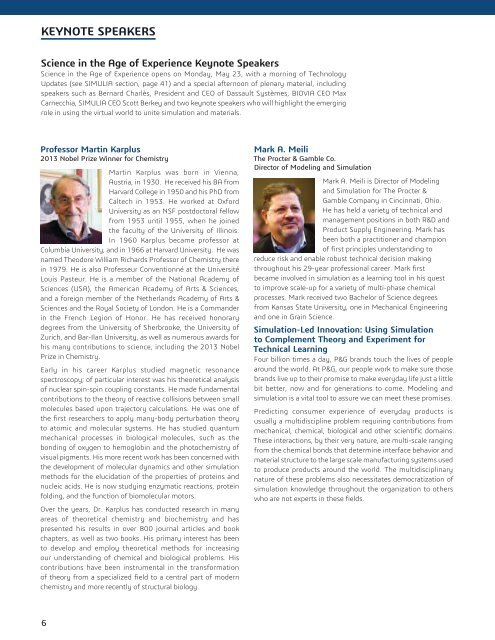ON-SITE PROGRAM
4n2ch
4n2ch
You also want an ePaper? Increase the reach of your titles
YUMPU automatically turns print PDFs into web optimized ePapers that Google loves.
KEYNOTE SPEAKERS<br />
Science in the Age of Experience Keynote Speakers<br />
Science in the Age of Experience opens on Monday, May 23, with a morning of Technology<br />
Updates (see SIMULIA section, page 41) and a special afternoon of plenary material, including<br />
speakers such as Bernard Charlès, President and CEO of Dassault Systèmes, BIOVIA CEO Max<br />
Carnecchia, SIMULIA CEO Scott Berkey and two keynote speakers who will highlight the emerging<br />
role in using the virtual world to unite simulation and materials.<br />
Professor Martin Karplus<br />
2013 Nobel Prize Winner for Chemistry<br />
Martin Karplus was born in Vienna,<br />
Austria, in 1930. He received his BA from<br />
Harvard College in 1950 and his PhD from<br />
Caltech in 1953. He worked at Oxford<br />
University as an NSF postdoctoral fellow<br />
from 1953 until 1955, when he joined<br />
the faculty of the University of Illinois.<br />
In 1960 Karplus became professor at<br />
Columbia University, and in 1966 at Harvard University. He was<br />
named Theodore William Richards Professor of Chemistry there<br />
in 1979. He is also Professeur Conventionné at the Université<br />
Louis Pasteur. He is a member of the National Academy of<br />
Sciences (USA), the American Academy of Arts & Sciences,<br />
and a foreign member of the Netherlands Academy of Arts &<br />
Sciences and the Royal Society of London. He is a Commander<br />
in the French Legion of Honor. He has received honorary<br />
degrees from the University of Sherbrooke, the University of<br />
Zurich, and Bar-Ilan University, as well as numerous awards for<br />
his many contributions to science, including the 2013 Nobel<br />
Prize in Chemistry.<br />
Early in his career Karplus studied magnetic resonance<br />
spectroscopy; of particular interest was his theoretical analysis<br />
of nuclear spin-spin coupling constants. He made fundamental<br />
contributions to the theory of reactive collisions between small<br />
molecules based upon trajectory calculations. He was one of<br />
the first researchers to apply many-body perturbation theory<br />
to atomic and molecular systems. He has studied quantum<br />
mechanical processes in biological molecules, such as the<br />
bonding of oxygen to hemoglobin and the photochemistry of<br />
visual pigments. His more recent work has been concerned with<br />
the development of molecular dynamics and other simulation<br />
methods for the elucidation of the properties of proteins and<br />
nucleic acids. He is now studying enzymatic reactions, protein<br />
folding, and the function of biomolecular motors.<br />
Over the years, Dr. Karplus has conducted research in many<br />
areas of theoretical chemistry and biochemistry and has<br />
presented his results in over 800 journal articles and book<br />
chapters, as well as two books. His primary interest has been<br />
to develop and employ theoretical methods for increasing<br />
our understanding of chemical and biological problems. His<br />
contributions have been instrumental in the transformation<br />
of theory from a specialized field to a central part of modern<br />
chemistry and more recently of structural biology.<br />
Mark A. Meili<br />
The Procter & Gamble Co.<br />
Director of Modeling and Simulation<br />
Mark A. Meili is Director of Modeling<br />
and Simulation for The Procter &<br />
Gamble Company in Cincinnati, Ohio.<br />
He has held a variety of technical and<br />
management positions in both R&D and<br />
Product Supply Engineering. Mark has<br />
been both a practitioner and champion<br />
of first principles understanding to<br />
reduce risk and enable robust technical decision making<br />
throughout his 29-year professional career. Mark first<br />
became involved in simulation as a learning tool in his quest<br />
to improve scale-up for a variety of multi-phase chemical<br />
processes. Mark received two Bachelor of Science degrees<br />
from Kansas State University, one in Mechanical Engineering<br />
and one in Grain Science.<br />
Simulation-Led Innovation: Using Simulation<br />
to Complement Theory and Experiment for<br />
Technical Learning<br />
Four billion times a day, P&G brands touch the lives of people<br />
around the world. At P&G, our people work to make sure those<br />
brands live up to their promise to make everyday life just a little<br />
bit better, now and for generations to come. Modeling and<br />
simulation is a vital tool to assure we can meet these promises.<br />
Predicting consumer experience of everyday products is<br />
usually a multidiscipline problem requiring contributions from<br />
mechanical, chemical, biological and other scientific domains.<br />
These interactions, by their very nature, are multi-scale ranging<br />
from the chemical bonds that determine interface behavior and<br />
material structure to the large scale manufacturing systems used<br />
to produce products around the world. The multidisciplinary<br />
nature of these problems also necessitates democratization of<br />
simulation knowledge throughout the organization to others<br />
who are not experts in these fields.<br />
6


